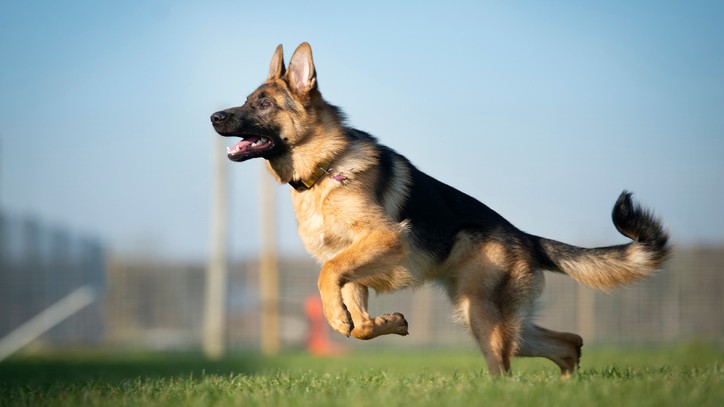
Best Diet for German Shepherd Puppies: A Guide to Optimal Nutrition
Share
As a health-conscious pet owner, you know that the early stages of a puppy's life are crucial for their development. When it comes to German Shepherd puppies, providing the best diet is essential to ensure they grow into strong and healthy adults. In this comprehensive guide, we delve into the essentials of feeding your German Shepherd puppy, helping you make informed choices about their nutrition.

The Importance of Proper Nutrition for German Shepherd Puppies
German Shepherds are known for their intelligence, strength, and loyalty. To support these traits, they require a diet that meets their unique nutritional needs. The best diet for German Shepherd puppies is not just about feeding them well but also about understanding what their growing bodies need.
A balanced diet can significantly impact your puppy's growth, immune system, and overall health. Proper nutrition helps in developing strong bones, a shiny coat, and a robust immune system. According to the Kennel Club, German Shepherds thrive on well-balanced diets tailored to their specific needs.
Key Nutritional Needs
Protein: The Building Block
Protein is the cornerstone of a puppy's diet, especially for breeds like the German Shepherd that are prone to muscle development. It's crucial to provide high-quality protein sources such as chicken, beef, or lamb. These proteins support muscle growth and repair, ensuring your puppy develops strong and healthy muscles.
Fats: Essential for Energy
Fats are a vital energy source for puppies. They help in absorbing vitamins and provide the energy needed for growth and play. Look for diets that include healthy fats like omega-3 fatty acids, found in fish oil, which also support a shiny coat and healthy skin.
Carbohydrates: Fuel for Growth
While proteins and fats are crucial, carbohydrates also play an essential role in your puppy's diet. They provide the energy required for growth and daily activities. Whole grains like brown rice and oats are excellent carbohydrate sources that aid digestion and provide sustained energy.
Choosing the Right Food
Commercial vs. Homemade Diets
When selecting the best diet for German Shepherd puppies, you have the option of commercial puppy food or homemade diets. Commercial puppy foods are formulated to include all the necessary nutrients, while homemade diets allow for customization. However, ensuring that homemade diets meet all nutritional needs can be challenging without expert guidance.
For detailed tips on managing your German Shepherd's weight, check out our article on weight management.
What to Look for in Commercial Puppy Food
When choosing commercial puppy food, ensure it is specifically formulated for large breeds. Look for brands that use high-quality ingredients without artificial preservatives, colors, or flavors. The food should meet the nutritional levels established by the AAFCO (Association of American Feed Control Officials).
Feeding Schedule and Portions
Establishing a consistent feeding schedule helps regulate your puppy's metabolism and digestion. Typically, German Shepherd puppies should be fed three to four times a day until they are around six months old, after which you can reduce the frequency to two meals per day. The portion size should be based on your puppy's age, weight, and activity level.
For more insights on caring for German Shepherds, explore our article on care options.
Common Dietary Mistakes
Overfeeding and Underfeeding
Overfeeding can lead to obesity, while underfeeding can result in malnutrition and stunted growth. It's crucial to monitor your puppy's weight and adjust their diet as needed. Consult with your veterinarian to determine the ideal weight range for your puppy.
Ignoring Allergies and Intolerances
German Shepherds are prone to food allergies and intolerances. Common allergens include grains, chicken, and beef. If you notice symptoms like itching, diarrhea, or vomiting, consult your vet to identify potential allergies and adjust their diet accordingly.
Conclusion
Providing the best diet for German Shepherd puppies is an investment in their future health and happiness. By understanding their nutritional needs and making informed choices, you can ensure your puppy grows into a healthy and active adult. For more detailed information on German Shepherd care, visit Dogster.

Frequently Asked Questions
What is the best protein source for German Shepherd puppies?
The best protein sources include chicken, beef, and lamb. These proteins support muscle development and overall growth.
How often should I feed my German Shepherd puppy?
Feed your puppy three to four times a day until six months old, then reduce to two meals per day.
Can German Shepherd puppies eat raw food?
While some owners prefer a raw food diet, it's essential to ensure it meets all nutritional needs. Consult with your veterinarian before making any changes to your puppy's diet.
This article contains affiliate links. We may earn a commission at no extra cost to you.
